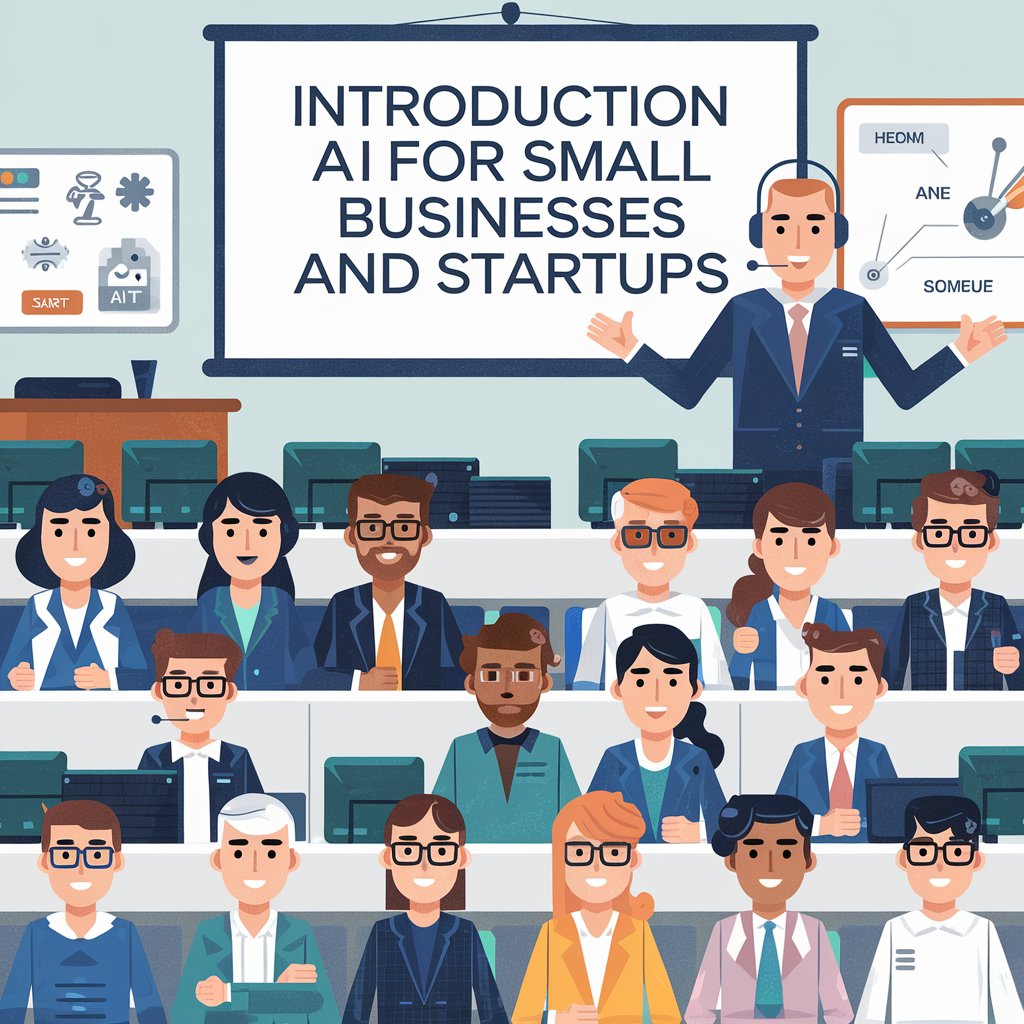In today’s tech-driven world, artificial intelligence (AI) is more accessible and affordable than ever, even Introduction to AI for Small Businesses and Startups. No longer exclusive to large corporations, AI has become a game-changer for smaller businesses looking to streamline operations, engage customers, and improve overall productivity. But what exactly can AI do for a small business, and how can you implement it without breaking the bank? Let’s dive into the essentials of using AI to grow a small business.
Table of Contents

What is Artificial Intelligence?
AI, or artificial intelligence, refers to technology designed to simulate human intelligence. It encompasses everything from simple task automation to complex problem-solving and decision-making abilities. For small businesses, there are generally two types of AI to consider:
- Narrow AI: Specialized for a specific task, like customer support chatbots.
- General AI: Broader intelligence, capable of performing multiple tasks—though this is less common and more complex.
How AI Benefits Small Businesses
When leveraged effectively, AI can bring various advantages to small businesses:
- Cost Savings: AI automates routine tasks, reducing the need for additional staff and helping to cut operational costs.
- Increased Efficiency: By handling repetitive tasks and speeding up processes, AI frees up time for employees to focus on strategic and creative projects.
- Better Decision-Making: AI provides data insights that support informed business decisions, leading to improved outcomes.
Popular AI Applications for Small Businesses
Many small businesses are already using AI, whether they realize it or not! Here are some popular ways small businesses can benefit from AI:
- Customer Service Automation: Chatbots and virtual assistants respond to common queries around the clock.
- Marketing Personalization: AI algorithms analyze customer preferences, helping businesses deliver more targeted campaigns.
- Sales Prediction Tools: AI can forecast demand, making inventory management more accurate.
AI in Customer Service
Small businesses often struggle with providing 24/7 customer service. This is where AI-driven chatbots and virtual assistants come in. These tools can handle routine inquiries, assist customers outside of business hours, and free up time for your staff to address more complex issues.

Enhancing Marketing with AI
AI is a game-changer for marketing, especially for small businesses that can’t afford large advertising budgets. By analyzing customer data, AI helps you better understand your audience, allowing you to deliver personalized marketing content. From automated email campaigns to targeted social media ads, AI can ensure your message reaches the right people at the right time.
Sales Prediction and Analysis
Knowing what your customers need before they know themselves sounds like a superpower, but it’s possible with AI-driven sales prediction tools. These tools analyze past purchasing data to forecast future sales, helping small businesses plan inventory and promotions more effectively.
AI for Business Automation
Automation is one of the most practical ways to use AI. By automating repetitive tasks like data entry, scheduling, and inventory management, businesses can operate more efficiently. AI helps ensure that tasks are completed accurately, reducing human error and enhancing productivity.
AI in Financial Management
AI-powered tools are transforming financial management for small businesses by simplifying cash flow management, identifying potential risks, and even flagging unusual account activity for fraud detection. These tools can help business owners keep a better eye on their finances without needing to hire a full-time accountant.
AI-Powered Project Management Tools
Managing projects can be challenging, especially for startups. AI-based project management tools help assign tasks, track deadlines, and ensure everyone on the team stays on track. Tools like Trello and Asana now have AI features that can optimize workflows, making project management more manageable and effective.

Affordable AI Tools for Small Businesses
One of the main concerns for small businesses is budget. Here are some affordable AI tools that can offer great results:
- Chatfuel: An easy-to-use chatbot builder for customer service.
- Hootsuite Insights: For social media marketing analytics.
- QuickBooks: An AI-powered tool for financial management.
- Grammarly: For proofreading and writing assistance. These tools offer free or low-cost plans, making them accessible even to those with limited budgets.
Overcoming Challenges in AI Implementation
Implementing AI doesn’t come without challenges. Common obstacles include high upfront costs, lack of technical expertise, and a need to integrate AI with existing systems. Start small, perhaps with a simple chatbot or data analysis tool, and gradually add more as your team gets comfortable with the technology.
Building an AI Strategy for Your Business
Before diving headfirst into AI, develop a clear strategy. Define what areas of your business would benefit the most, whether it’s customer service, marketing, or inventory management. Set realistic goals, such as reducing customer wait times or increasing sales leads, and start with one or two applications to test before expanding.
The Future of AI for Small Businesses
AI technology is evolving rapidly, and small businesses will continue to benefit as it becomes more affordable and accessible. Trends to watch include the rise of voice-activated assistants, increased automation, and more predictive analytics, all designed to simplify business management and enhance customer experience.
Conclusion
Embracing AI doesn’t mean transforming your small business into a tech powerhouse overnight. Instead, consider it a gradual journey, taking small steps aligning with your business goals. Start with a chatbot or a marketing tool and expand as you see results. With a thoughtful approach, AI can be a valuable asset, allowing your small business to compete in today’s competitive market.
FAQs
Q1: How can AI help small businesses save money?
AI can automate tasks that would otherwise require additional staff, such as customer service, marketing, and financial management, helping significantly cut costs.
Q2: Are there any free AI tools for small businesses?
Yes, many tools offer free versions or affordable plans. Examples include Chatfuel for chatbots, Grammarly for writing, and Hootsuite for social media insights.
Q3: Do small businesses need technical knowledge to use AI?
While technical knowledge can help, many AI tools today are user-friendly and require minimal setup, making them accessible to non-tech-savvy users.
Q4: What is the best area to start with AI in a small business?
Customer service and marketing are great starting points, as AI can automate customer interactions and analyze data for targeted marketing.
Q5: Can AI help small businesses with data analysis?
Absolutely! AI tools can process large amounts of data, providing insights on customer behavior, sales trends, and inventory needs, allowing for better decision-making.

